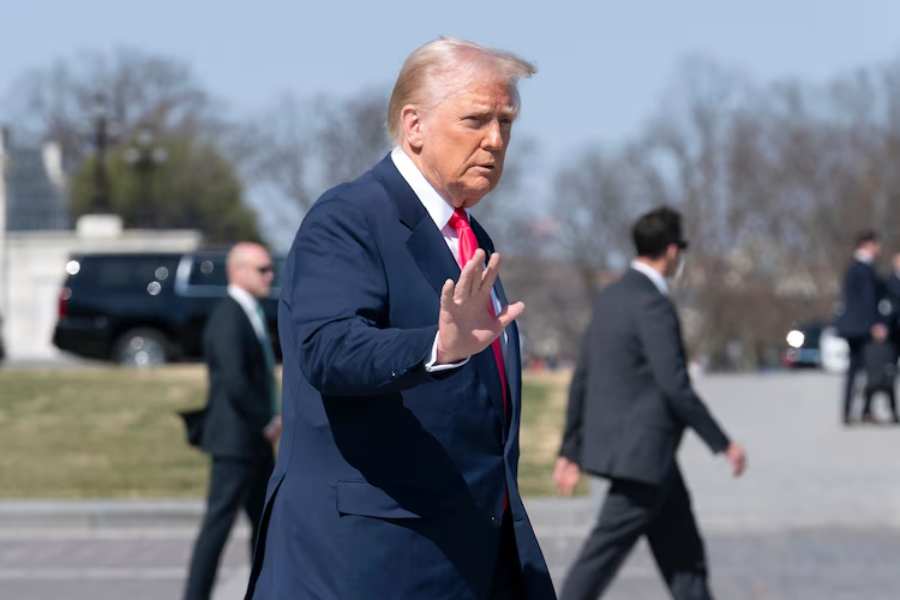The Trump administration has escalated its legal battle over deportations under the Alien Enemies Act, challenging a federal judge’s order to halt the removal of noncitizens accused of gang affiliations. The standoff has sparked a high-profile dispute between the executive and judicial branches, with the Department of Justice (DOJ) considering invoking the state secrets privilege to withhold information about two recent deportation flights to El Salvador.
The conflict began when U.S. District Judge James Boasberg issued an injunction preventing the deportation of several individuals, citing due process concerns and questioning the legality of the removals. The administration claimed these individuals were affiliated with the Venezuelan gang Tren De Aragua, though ICE officials acknowledged that many lacked criminal records in the United States. In response, the DOJ refused to provide details about the flights, arguing that revealing such information would pose a national security risk.
In a legal filing on Wednesday, the administration argued that the judiciary had overstepped its constitutional authority. “The underlying premise of these orders is that the Judicial Branch is superior to the Executive Branch, particularly on non-legal matters involving foreign affairs and national security,” the DOJ wrote. “The Government disagrees.” The administration asserted that immigration enforcement, particularly under the Alien Enemies Act, falls exclusively within the president’s domain.
Judge Boasberg responded by granting the DOJ a one-day extension, giving them until noon on Thursday to either comply with his request or formally invoke state secrets protections. Meanwhile, the DOJ filed an emergency appeal with the D.C. Circuit Court, seeking to overturn the judge’s ruling and reaffirm the president’s unilateral power over deportations.
“Merits aside, the equities strongly favor the government, given the manifest harms to the public from letting dangerous alien members of a foreign terrorist organization remain in the country,” the DOJ stated in its appeal. However, the lack of clear evidence linking the deportees to criminal activity has raised concerns that the administration is operating without definitive legal justification.
The legal battle has now moved to the D.C. Circuit Court of Appeals, where a three-judge panel—two of whom were appointed by Republican presidents—will hear oral arguments on Monday. The case is shaping up to be a landmark decision on executive power in immigration enforcement.
Meanwhile, President Trump has intensified his attacks on Judge Boasberg, taking to Truth Social to condemn the ruling.
“If a President doesn’t have the right to throw murderers and criminals out of our Country because a Radical Left Lunatic Judge wants to assume the role of President, then our Country is in very big trouble!” Trump wrote.
Trump’s latest outburst follows his call for Boasberg’s impeachment, a move that has drawn widespread criticism from legal experts and lawmakers. In an interview with Fox News’ Laura Ingraham, Trump doubled down, calling Boasberg an “Obama-appointed radical left judge” who is obstructing efforts to remove dangerous individuals. “He said we shouldn’t be able to take criminals, killers, gang members, and gang leaders out of our country,” Trump claimed.
The unprecedented call for impeachment prompted an immediate response from Chief Justice John Roberts, who issued a rare public rebuke. “For more than two centuries, it has been established that impeachment is not an appropriate response to disagreement concerning a judicial decision,” Roberts said in a statement, emphasizing that “the normal appellate review process exists for that purpose.”
While the impeachment of a federal judge is technically possible, the process is highly complex. A simple majority in the House is required to pass articles of impeachment, but a two-thirds vote in the Senate is necessary to convict and remove a judge. Historically, judicial impeachments have been extremely rare.
Despite Roberts’ remarks, Trump brushed off the criticism, noting that the Chief Justice did not mention him by name. “He didn’t mention my name in the statement. I just saw it quickly. He didn’t mention my name,” Trump remarked.
The legal dispute underscores the broader battle over immigration policy, with the Trump administration seeking to expand executive authority and bypass judicial oversight. Critics argue that the lack of transparency and due process in the deportation cases sets a dangerous precedent, while supporters contend that national security concerns justify swift action.
With the D.C. Circuit Court’s ruling pending, the stakes remain high. If the court sides with the administration, it could grant the president sweeping power over deportations under the Alien Enemies Act. If Judge Boasberg’s ruling is upheld, it would represent a significant check on executive authority, reinforcing the judiciary’s role in immigration enforcement.
As the legal battle unfolds, the Trump administration remains defiant, committed to pursuing its hardline immigration policies. Whether the courts will uphold or limit the president’s powers in this case could have far-reaching implications for future immigration enforcement and the balance of power between the branches of government.
